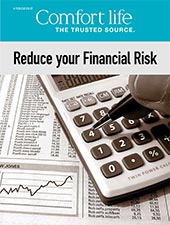Buy shares: John Bart, editor of Canadian ShareOwner, says they are a good way to ensure you don't outlive your money. Be prudent, he says, and invest regularly in a diversified selection of the highest-quality growth stocks. His organization screens 100 such companies, allowing subscribers to purchase batches of shares for one $29 fee.
Think annuities:
Annuities have been out of style because of record low interest returns. Rates are climbing modestly and, says Wouters, annuities have two advantages: they are tax efficient and they never run out. An annuity might be a useful part of your plan. Consider it longevity insurance.
Cash RSPs early:
If you have several low-income years before age 69 (when you must switch your RSP into an RIF), think of cashing in some of your RSP. That way you avoid a heftier income from your RIF later, which might prevent you getting the guaranteed income supplement or result in an old age security clawback.
Give it away:
Contrary to what many believe, Canada does not have a gift tax. So it may be better to give money to your kids now, when they need it in the family formative years, rather than waiting until you die when they may already be middle-aged.
Give the grandest gift:
Set up a Registered Education Savings Plan (or plans) for your grandchildren. The government adds up to $400 a year to your savings.
Take less interest:
GICs and Canada Savings Bonds used to be the bedrock of our savings plans. Today's tax laws make interest the least desirable form of income. Dividends from Canadian corporations (banks and pipeline companies tend to be the old reliables) receive favoured tax treatment. Capital gains, only 50 per cent of which are taxed, are the best bet.
Create income trusts:
They're tax-favoured and often produce 6 per cent or better return. But be careful, these are not bonds - their value goes up and down. Real estate investment trusts (REITs) can be reliable 8if carefully chosen; energy funds tend to be volatile. The higher the return, the greater the risk.
Don't bet on it:
Casino gambling can be entertaining. But for many seniors it's becoming an obsession, in some cases bringing ruin and tragedy. Limit yourself - perhaps to one visit a month, and go home when you've lost your preset limit.
Listen up, women:
Can't say it too often: men still fare better in retirement because most have better private pensions. Because many women must rely on old age security and investment income, they need to pay more attention to their investments.
Start a post-retirement business:
If there's income, charge part of your home for office expenses and employ your spouse. Under Canada Revenue Agency health trust legislation (www.cra.gc.ca), the self-employed can buy tax-deductible, tailor-made health plans to cover everything from your teeth to . . . well, your Viagra.
Split the proceeds:
You can split Canada Pension Plan income equally to keep taxes down, and CPP recently started paying a modest pension to women for those years they were at home caring for the family. It often makes sense to start collecting CPP at age 60 if you have essentially stopped working.
Mired in mutual funds?
The returns in recent years were dismal, yet mutual fund managers still collected management expense ratio fees. Many funds are back-end loaded, meaning you pay a fee to get out. With systematic withdrawal, you can cash in 10 per cent of your fund annually without incurring fees.
Claim eligible care costs:
Retirement home residents (as well as people living at home or in nursing homes) can now claim the cost of attendant care up to $10,000 on their income tax returns. For info on a back claim, contact Canada Revenue Agency (1-800-959-8281). The Ontario Ministry of Health and Long-Term Care supplements the costs of visual aids, walkers and power chairs, and pays 75 per cent of the cost of hearing aids, up to $500.
Take credit as a caregiver:
Caring for a parent or grandparent over 65? You can claim a caregiver tax credit. A disability tax credit of $6,180 is also there for the asking.
Claim home reno costs:
Renovations for age-related handicaps can be claimed by lower-income seniors, and they are also eligible for forgivable loans up to $3,500 for these improvements (details from Canada Mortgage and Housing Corporation, www.cmhc-schl.gc.ca, 1-800-309-3388). Adaptations to care for Alzheimer patients (a CMHC booklet, At Home with Alzheimer's Disease, is invaluable) also qualify for tax breaks and loans.
Reduce bank charges:
Check if your bank has a seniors’ package of fee-free services. Also check credit unions, which are often a better deal, and look into online banking to save on paying bills. Use only your own bank's ATMs, and get cash back when you use your debit card at the supermarket.
Enjoy golden discounts:
Don't be shy asking about senior discounts, whether on the ski hill, for flights or (and these are quite generous) Via Rail.
Consider reverse mortgages:
Last resort for strapped seniors wanting to stay put, but be careful - interest charges can soon erode your equity.
Use your home as collateral:
Get a bank line of credit for, say, $100,000, while you're still getting a paycheque. You may not need it, but if a son or daughter wants to borrow money later to buy a house, it's instantly available, no questions asked.
When it comes down to it, some of the oldest advice still may be the best: don't put all your financial eggs in one basket.
Frank Jones is the author of Head Start: How to Save for Your Children's or Grandchildren's Education, written with Gordon Pape.




